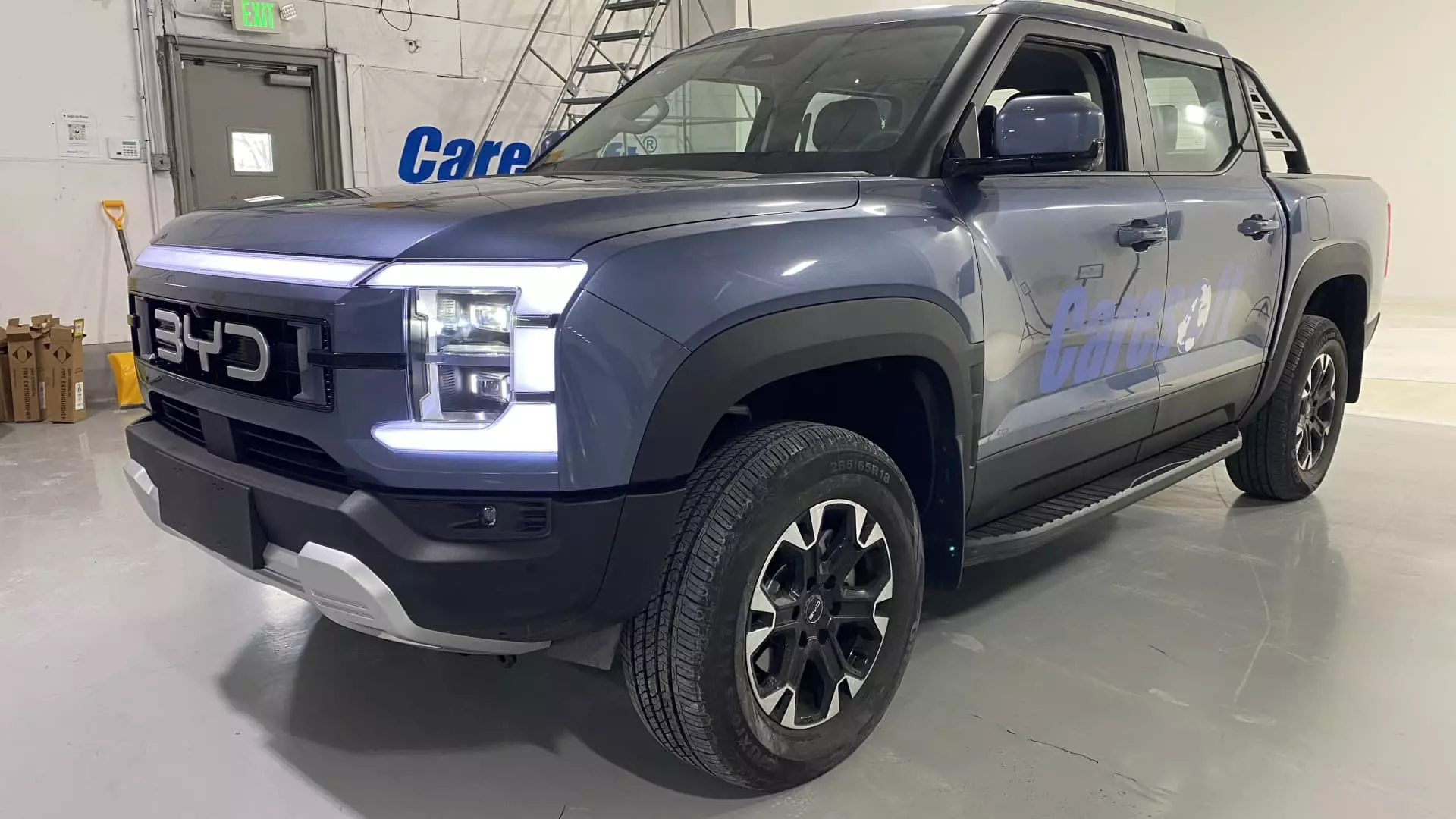As the automotive landscape continues to evolve, the entry of Chinese automaker BYD Auto into the global pickup truck segment signals an intriguing shift in competition for American car manufacturers. With the launch of the BYD Shark, a vehicle that shares aesthetic and functional similarities with well-established American models, the stakes have never been higher for traditional automotive giants like Ford and Toyota. This article delves into the implications of BYD’s expansion, the potential impact on local markets, and the broader picture of the changing automotive landscape.
At first glance, the BYD Shark appears to fit effortlessly within the established pickup truck market, showcasing a design ethos that closely resembles popular U.S. models like the Ford F-150 and Explorer. This visual affinity could mislead consumers into believing the Shark is an American-made vehicle. As automakers face increasing scrutiny in terms of branding and consumer perception, BYD’s strategic design choices may position it advantageously against incumbents. The Shark’s exterior and features suggest not only an understanding of market demands but also an ambition to capture the hearts—and wallets—of the global consumer.
However, the vehicle’s success will ultimately depend on its ability to navigate consumer expectations and local market dynamics, particularly in regions where American brands traditionally dominate. By intersecting familiarity with innovation, BYD could carve out significant market share, particularly in countries like Australia, Brazil, and Mexico, where it has already begun to stake its claim.
The Economic Landscape: Sales, Competition, and Strategic Responses
For American automakers, the BYD Shark is not merely an automotive competitor; it represents a serious threat to their profit margins, especially within the highly lucrative pickup segment. As Terry Woychowski from Caresoft Global noted, these vehicles constitute the “franchise” for traditional automakers, correlating directly with financial performance. With pickup truck sales consistently generating millions of units annually, awareness of competitive products like the Shark is urgent.
As BYD ramps up its production and export capabilities, the potential saturation of international markets with affordable vehicles could destabilize pricing structures. According to estimates from BofA Securities, BYD’s vehicle export growth signifies a shift in competitive dynamics, increasing from 2% to an expected 8% of vehicle exports in just two years. This upward trajectory suggests that a response from traditional manufacturers is critical—not only to protect market share but also to innovate and remain relevant.
BYD’s approach in integrating advanced hybrid technology differentiates the Shark from many offerings currently available in North America. The combination of a small internal combustion engine with electric motor capabilities not only provides efficiency but also caters to a growing environmentally conscious consumer base. The Shark’s potential to operate purely as an electric vehicle or through its hybrid system highlights significant engineering advancements.
However, early reviews suggest that there is still room for refinement in the vehicle’s overall driving experience. While BYD is making strides, components such as ride quality and handling could benefit from further development. The eagerness expressed by industry analysts about the truck hints at optimism for BYD to address these concerns, showcasing their commitment to continual improvement.
Despite the growing interest in BYD’s Shark, challenges remain. The competitive environment is ruthless, with established players like Ford and Toyota boasting decades of consumer trust and a deeply rooted presence within key markets. As Toyota’s chairman Akio Toyoda emphasized, responding proactively to changing market demands will be essential for survival. The way these traditional giants adapt to the new reality of affordable imports will shape the sustainability of their market positions.
Moreover, as automotive technology rapidly evolves, factors such as battery technology and manufacturing efficiency will determine not just competitive edge but also long-term viability. The unique features found in the Shark, like innovative battery placement and hybrid mechanisms, could serve as a stepping stone for further advancements.
As BYD Auto endeavors to establish its footprint in the pickup segment, the ramifications for American automakers are significant. The Shark’s combination of appealing design, innovative technology, and competitive pricing may disrupt traditional market dynamics, implementing a strong challenge to established brands. As they navigate this transformative landscape, the necessity for strategic adaptations and innovations will underscore the resilience and future growth of the automotive industry. Ultimately, the success of BYD will depend on its ability to align consumer preferences, regulatory frameworks, and manufacturing capabilities, thus unlocking new opportunities in an increasingly crowded market.

